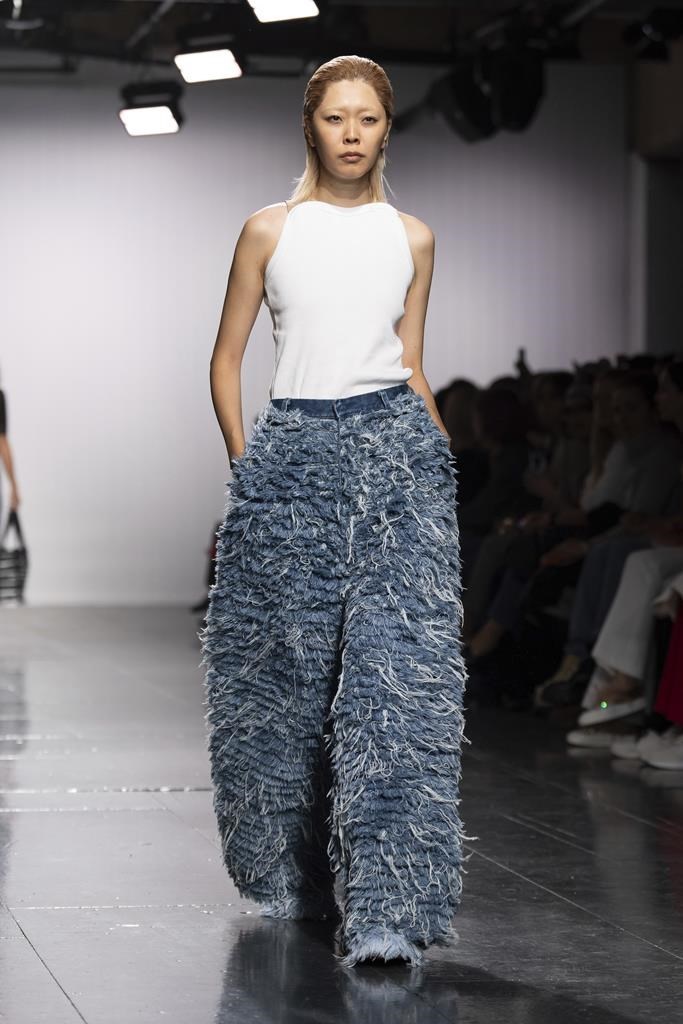LONDON (AP) ŌĆö For Ksenia Schnaider and her fellow Ukrainian fashion designers, the show must go on despite ŌĆö or precisely because of it.
For much of the past year, Schnaider and her team of seamstresses toiled away in their Kyiv studio, crafting her new collection of designer denim and luxury daywear even as air raid sirens, drone attacks and power cuts took over their lives and made production almost impossible to continue.
Schnaider, 39, fled Ukraine with her husband and young daughter when Russia invaded her country in 2022. They found a temporary home with a British family in a peaceful corner of southern England. But she hasnŌĆÖt put down the fashion business she founded 12 years ago, and continues to divide her time between the U.K. and Kyiv, where all her garments are still being made against the odds.
ŌĆ£My team needs this sense of normality ŌĆö they told me they want to go to work and have something to do, to support each other, rather than staying home hiding,ŌĆØ she added. ŌĆ£We want to show the world we donŌĆÖt give up.ŌĆØ
On Tuesday she and two other Ukrainian fashion designers showcased their latest creations in a joint catwalk show at London Fashion Week, which is adopting Ukraine Fashion Week for the second time this year as the war drags on and UkraineŌĆÖs fashion industry has nowhere to call home.
At the finale, they took their bows wearing a Ukrainian flag signed by soldiers from three different military units. Some of those men have died since signing the flags, she said.
ItŌĆÖs a poignant moment that the designer both looked forward to and dreaded because itŌĆÖs so emotionally overwhelming.
ŌĆ£ItŌĆÖs very hard ... but of course, it is important to show our unity. WeŌĆÖre not competitors anymore, weŌĆÖre all united in working for our victory,ŌĆØ she said.
Since the start of the war, more than 60 Ukrainian fashion brands have showcased their wares in cities including London and New York to ŌĆ£create, in contrast to the destruction brought by Russian aggression,ŌĆØ according to Iryna Danylevska, the founder and head of Ukrainian Fashion Week.
ŌĆ£Ukraine continues to live. Ukraine breathes, fights and creates,ŌĆØ reads a note found on every seat at Tuesday's catwalk display. ŌĆ£Our London Fashion Week runway show is another chance to speak to the world about the value of freedom and the price that must be paid for it.ŌĆØ
Schnaider, who has dressed celebrities including Dua Lipa, wonders how they keep going. "But for me, itŌĆÖs important to keep producing in Ukraine, to support its people, its economy.ŌĆØ
The catwalk may seem a million miles from the battlefield, but fashion is just one of many facets of a huge national effort to keep the world talking about Ukraine and raise funds and awareness for what its people are going through.
Another Ukrainian designer, Ivan Frolov, brought the flag of United24, President Volodymyr Zelenskyy's , to his fashion show in London's swanky Bulgari Hotel on Saturday.
Frolov, who has shot up in prominence after Beyonc├® chose his theatrical designs for her and her Dubai concert, knows the power of a celebrity fashion moment and how that could help Ukraine's cause.
ŌĆ£For me, fashion is not only about the clothes ŌĆö it's like a very powerful media platform that can sometimes spread messages better than any other industry,ŌĆØ said Frolov, 29.
For his latest show, black and white footage of old-time Ukrainian singers and historic video of Kyiv in bloom in the summer served as a backdrop for a collection of barely-there dresses, lavish silk and lace gowns and corsets encrusted with crystals.
Frolov acknowledged the seeming incongruity between his romantic vision and the war ravaging his country.
ŌĆ£It's a big challenge, to continue to do my work in the same moment when our soldiers are dying every day on the front line,ŌĆØ he said.
ŌĆ£We cry every day, and we continue to sew evening gowns for celebrities and for our clients. Of course we are waiting for victory for Ukraine, when we can wear these gowns,ŌĆØ he added. ŌĆ£But right now this is the only way we can show how strong we are. Ukraine is a young and beautiful country with big talents."
To bring home just how challenging the conditions have been for producing her clothes, Schnaider has attached special labels to every finished piece. Her customers can scan the label with their mobile phones to hear an air raid siren sound.
When war broke out Schnaider had a team of about 50. About 20 remain, some staffing her central Kyiv shop, others packaging, producing and shipping her garments to customers. When the sirens blast, her team puts down their tools and runs for shelter. Work would be interrupted for hours, or for the whole day.
Last winter was especially tough when electricity would be cut to just two hours per day, she said. She and her colleagues would try to cram all the work and daily tasks into those precious hours, before going home to ŌĆ£sit in the cold and in complete darkness.ŌĆØ
ŌĆ£It was very depressing, but we kept going, and we were joking it was the best time management," she said.
Other workers and small businesses in Kyiv are as determined as she is to keep normalcy going, she said.
ŌĆ£In the coffee shops, the mornings after the drone attacks, everyone would say ŌĆśletŌĆÖs drink more coffee' and swear at Russia,ŌĆØ Schnaider said. ŌĆ£They are all like ŌĆśletŌĆÖs do it, let's get back to work.'"
Sylvia Hui, The Associated Press



